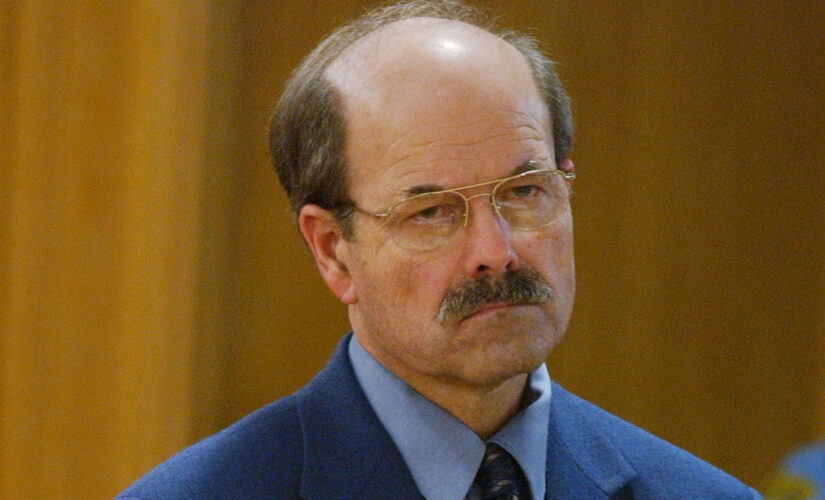Dennis Rader appeared as an ordinary family man in Wichita, Kansas, who collected stamps and served as the president of his church,
But the seeming doting father and trusted Cub Scout leader was also a murderer who terrorized residents for decades using the moniker BTK – bind, torture, kill.
In 2005, Rader, now 76, pled guilty to killing 10 people from 1974 to 1991. And for over a decade, Rader corresponded with Dr. Katherine Ramsland, a professor of forensic psychology, to better understand how lust, as well as a desire for fame and power, drove him to kill. Now, she’s sharing her story.
Ramsland is speaking out in a new true-crime docuseries on A&E titled “BTK: Confession of a Serial Killer.” The two-night special from executive producer Dick Wolf of the “Law & Order” franchise features never-before-heard conversations between Rader and Ramsland as they discuss his past and gruesome crimes.
“When I first wrote to him, he appreciated the fact that I had academic credentials and that I was also an expert on serial killers because I had done a lot of writing on them prior to talking with him,” Ramsland told Fox News. “But he had a test for me. He wanted me to solve some codes that he sent me.
“He wanted to make sure I wouldn’t just dismiss it. But for practical purposes, he wanted to use codes to disguise what we were talking about when we got into very dark, raw subjects. And I was willing to do that. That was a good signal to him that I would work with him in the way he wanted.”
BTK’S DAUGHTER TELLS ALL IN NEW DOC, SAYS FAITH HELPED HER FORGIVE SERIAL KILLER: ‘I JUST SHUT DOWN’
Ramsland first corresponded with Rader in 2010. They exchanged numerous letters, spoke on the phone and even met face-to-face at El Dorado Correctional Facility, a maximum-security prison in Kansas. In 2016, Ramsland wrote the book “Confession of a Serial Killer: The Untold Story of Dennis Rader, the BTK Killer” under an agreement that proceeds from its sale would go to the victims’ families trust fund.
“My initial impression of Dennis Rader was that he wanted to challenge me,” Ramsland said. “And what surprised me was the fact that there wasn’t anything in his background that would correspond with the typical formula we have of serial killers. I recently heard a detective say that all serial killers have trauma in their background. He was wrong about that.”
Serial killer Dennis Rader stands before Sedgwick County District Court Judge Greg Waller as sentencing is read Aug. 18, 2005, in Wichita, Kan. Rader was sentenced to nine life terms and a “hard 40” for the 10 murders he committed over nearly 30 years. ( Bo Rader-Pool/Getty Images)
“Dennis Rader challenges the idea we have about serial killers,” she added. “He was a family man. He was a churchgoer, even a president of his church congregation. He had a full-time job. He was part of his community. So we have to be careful about some of the stereotypes we form about these kinds of offenders.
“Otherwise, we’ll start thinking we know them when we don’t. And in Dennis’ case, there wasn’t any particular reason in his background. No trauma. He was an all-American boy, the oldest of four boys in his family. He had an intact family and played on his farm. So where did it all come from? That intrigued me.”
Rader joined the Air Force and married Paula Dietz in 1971. Every Sunday, he and his spouse went to church. The couple shares two children, a boy and a girl. Rader’s father, who died in 1996 after retiring as a plant operator at a utility company’s generating station, was described by childhood pals as strict but never cruel, the New York Times reported.
CLICK HERE TO SIGN UP FOR THE ENTERTAINMENT NEWSLETTER
Rader struck as the BTK for the first time in 1974. Four members of the Otero family — Joseph, 38, wife Julie, 34, and two of their children — Josephine, 11, and Joseph II, 9 — were bound and strangled inside their homes. The slain matriarch had worked on an assembly line for the Coleman Company, the same place Rader worked in the early ’70s.
The adult victims of the BTK killer. (AP Images)
Rader taunted the media and police with cryptic messages during a cat-and-mouse game that began after the murders. He signed the letters “BTK.”
That same year, 21-year-old Kathryn Bright, who also worked at the Coleman plant, was found stabbed in her home. She was bound with a cord and partially dressed. Her brother was shot but survived.
Rader returned to his seemingly normal life until 1977. Shirley Vian, 24, was found on her bed with a plastic bag over her head and a cord wrapped around her neck, hands and feet. That same year, 25-year-old Nancy Fox was strangled with nylon stockings in her home.
CLICK HERE TO GET THE FOX NEWS APP
Brandon Wegerle (L) embraces his sister Stephanie Clyne as their father Bill Wegerle makes a victim statement in the sentencing phase of Dennis Rader’s murder trial in Sedgwick County Courthouse Aug. 18, 2005, in Wichita, Kan. Vicki Wegerle was one of 10 people killed by Rader. (Bo Rader-Pool/Getty Images)
Rader hid in plain sight as he helped raise his family. Then in 1985, 53-year-old Marine Hedge was found strangled alongside a dirt road. The next year, 28-year-old Vicki Wegerle was found strangled in her bed.
Rader returned to a low-profile life once more as he became heavily involved in his church community. That changed in 1991 when he abducted 62-year-old Dolores Davis, his final victim, from her home. She was found strangled and bound under a bridge.
Ramsland said that growing up, Rader was “humiliated by his mother” which stayed with him over the years.
Katherine Ramsland speaks about Dennis Rader. (Lauren A. Little/MediaNews Group/Reading Eagle via Getty Images)
“That really played on him,” she explained. “It’s something he still thinks about, even to this day. And we haven’t studied humiliation as a factor in the development of extreme offenders much. And I think maybe we need to rethink that. And he certainly got an early exposure to using ropes for an erotic activity.
“And then he began to read these true detective magazines that his father would hide in the car. So that made him clandestine … He wanted to feel significant. And he wanted to have power over women because females made him feel off balance.”
BTK KILLER DENNIS RADER TELLS ALL IN UNHEARD INTERVIEW FOR DOC: ‘IT’S A DEMON THAT’S WITHIN ME’
“He didn’t like that as the oldest boy, he was expected to be strong and masculine, and yet they seem to kneecap him right and left without even trying, just by being female,” she shared. “And his fantasy life certainly propelled him.”
Rader resurfaced in 2004 with more chilling, taunting letters. The break in the case came in 2005 after a computer disk Rader sent was traced to his church. His chilling courtroom confession ended a mystery that haunted Wichita for decades. He was sentenced to 10 consecutive life terms in prison.
Wichita Police Det. Sam Houston shows a mask used in one of the crimes, during Dennis L. Rader’s sentencing hearing Aug. 18, 2005, in Wichita, Kan. (Bo Rader-Pool/Getty Images)
“During that courtroom hearing, Dennis felt like he was in a position to teach people about who he was,” said Ramsland. “In a way, he also thought of himself as a victim. He thought he had some things in common with the victims … Rader is a narcissist, so he just thought this was a way to present himself.”
When asked if Rader saw himself as a monster, Ramsland said, “At times.”
“Dennis Rader does think of himself as a monster, but he also thinks of himself as a good person who did some bad things,” she explained. “He will talk about a monster in his brain. It’s his ‘Factor X,’ which is a way to distance himself from criminal responsibility. He thinks, for the most part, he’s not a monster. He certainly was in those instances when he selected a victim and carried through with his crimes. But overall, he doesn’t think of himself that way.”
Rev. Michael Clark (center), pastor of Christ Lutheran Church, where Dennis L. Rader was a member, walks past media outside the Sedgwick County Courthouse on the second day of sentencing Aug. 18, 2005, in Wichita, Kan. (Larry W. Smith/Getty Images)
As for remorse? Ramsland said it depends on the day.
“He certainly regrets a lot because he doesn’t want to be in prison,” she shared. “He didn’t want to lose his family. There’s a lot of regret there with that. But that’s not the same as remorse. It depends on his mood. It’s a concept he calls ‘cubing,’ where he has various faces of a cube he can turn on and off. So sometimes he’s a good family man. Sometimes he’s a serial killer, a thief or a liar. Sometimes he’s the churchgoer who studies the Bible. So it depends on what day you get him as to whether you’ll hear him talk about remorse.”
“BTK: Confession of a Serial Killer” premieres Saturday, January 8th at 9 p.m. on A&E. The Associated Press contribued to this report.




